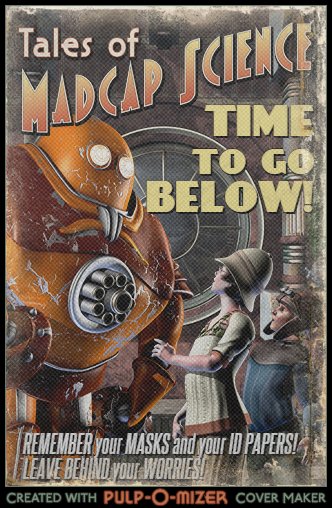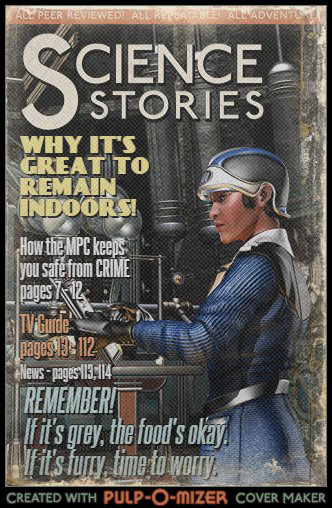Excerpt found from survivor's journal, date indeterminate...
The Clean Slate Policy.
That's what they called what we did.
Well, to be honest, they probably named it a bit later on. I mean, it beats the alternative of somebody having thought this up long enough ago to have had time to come up with a cool sounding name. I prefer to think that shortly after we did it someone high up decided that it needed a name or else it will seem like the multinational panic attack that it was. Operation Oh No, Now Look What We Did probably didn't sound professional enough.
... Let me explain.
We have always wondered what would happen if aliens ever found us. In the early days of curiosity many people insisted that this had already happened, but the march of technology gradually proved them to be talking out of their (not actually probed by aliens) backsides. When everyone was continually carrying around at least one item capable of recording high resolution images it became harder and harder to hide that there really was no evidence of visitations from another planet.

So, we entered the next stage of enlightenment regarding our place in the universe. We were probably not alone but we were definitely being left alone. If there was anything out there then it was either too distant, too undeveloped or too uninterested to turn up any time soon and maybe we should start thinking about being the ones to go out there and be a cause of implausible conspiracy theories on other planets. We still had no idea what scientific advantage taking any readings via anal probes had (except maybe taking their temperature) so we'd probably skip that. This was not an entirely popular approach, many finding the sudden increase in intellectual smugness more than a little grating, but it at least inspired global co-operation towards taking ourselves beyond this planet and go looking for something different to pick a fight with. It really was a shame the assumptions were only temporarily correct.
We started work on the Ark Project before we really had any particular place to aim them. I think the general idea was that by the time you can see if somewhere's worth going to then it probably isn't any more, so why not just head in a good direction and narrow down where you want to go once you get nearer? We still hadn't worked out faster than light travel so it was definitely going to have to take the scenic route, however the compromise was that we sent slow ships now on the promise that if we did work out anything faster then we'd swing by and pick them up on the way. Cryogenics was chosen over multi generation ships, partly because of the issues with a narrow gene pool for each generation but mostly because space would probably get boring very quickly. The final design was a massive nuclear drive (probably in the hope that a nuke that size will scare physics into co-operating), an Advanced Biodome Manufactory (because apparently the ability to design something does not mean you're any good at naming it), a large freezer section and a really powerful beacon (because come on guys, you promised to pick us up). We were getting ready to spread our wings.
Of course, all this innovation was a massive bonus to areas outside the space race. We needed to ensure that any machinery was autonomous and would not require oversight or maintenance, the advances in AI this required lead to a new leap in robotics. This - combined with close network nanobots that were designed to repair and rebuild ship components - meant we could really revolutionise the way we could pick fights with each other, but also meant that every country ended up with a completely mechanised army. We had now reached a pinnacle in wargaming as nobody was getting hurt in wars except the civilians, which meant that the civilian population quite rightly came to the conclusion that you can just cut that out right now. They created the Mechanised Peacekeeping Corps, a multipurpose army of robots whose job it was to make sure that the actual Army couldn't bring any of their wars over to anywhere that might get people hurt. It probably says something slightly sad about humanity that once nobody was getting hurt at all then war pretty much ended. We kept the MCP running just in case people started getting nostalgic.
A lot of the next few years kind of got a bit frantic and most records of exactly what happened were fried or buried. What we do know is that it turns out we don't have the monopoly on being really inconsiderate tourists. When the Aliens arrived they probably didn't mean to screw us over, it's just that it turned out that their drive technology was massively incompatible with how our atmosphere worked. Also, as far as we could tell their means of communication were so foreign to ours that we had no way to speak to them. They seemed content to calmly scan and catalogue our planet as our sky quietly tore itself to pieces and we screamed at them to leave.
We eventually made them realise they weren't welcome by attempting to blow them out of the sky. I still take some comfort in how this wasn't Plan A for a change, it's a shame the Aliens weren't as tactful. Conventional weapons seemed to do so little damage that more than once a ship was seen to catalogue the missiles as they approached. It wasn't until we started nuking them that they started falling from the sky.
Suddenly everything changed.
Our first clue that we were in trouble was a few weeks later when a new type of ship landed on Japan. All of Japan. It then took off and did the same again to New Zealand. It turned out that not only was their propulsion and their language completely unrecognisable to us, so was their method of combat. There's something terrifying and also really insulting about having something that big bounce your civilization flat, so at this point the Clean Slate Policy was used.
Some time before this we had started to move underground to preserve our air through cannibalised biodomes from the Arks, now we'd reached the stage where we had a number of viable ecosystems running in communes below each continent. Each country agreed to join together to clear the planet once and for all, stripped their Arks of everything but the drive and pointed it at the new arrival. At the designated hour every nuke left on the planet and every Ark ship flew to the crater formerly known as New Zealand.

I'm guessing what happened next must've looked really impressive to anyone dumb enough to have been watching. All I know is that after the world's largest firework display we suddenly had no Aliens and desirability for above ground real estate would be at an all time low for a few thousand years. One of the gutted Arks was not reprogrammed properly before it was launched so we also basically launched a massive nuke into space and asked it to go find somewhere inhabited to hit. I would just like to say to the Universe, 'Oops! Still, you started it so screw you.'
So, yeah, that was pretty much the end of life on the surface of Earth. Still, we are nothing if not adaptable (to a cynic we may seem to be pretty much cockroaches with smartphones) and after some time life underground started to seem normal. The lights simulate slightly dull weather, the air is clear and once we dug out enough space we were able to start growing protein and other ingredients into something that kept you alive but made you wonder if that was a good idea.

After a few years we'd got things working pretty well. We'd managed to convince ourselves that what we were eating counted as food, we'd made enough space so that we had built everything we needed and even a few things we didn't. Now that we had restarted a viable news and media service it was really easy to get really angry about things we didn't really understand but there was no way to let all that aggression out. The MCP was more than capable of policing any small confrontations and there just wasn't the room for a war. Something needed to be done, and someone wanted to put it on TV.
Remnant Arena came about through a combination of necessity, psychology and media studies. As a species we are prone to having fights, or at the very least watching other people have fights. Each commune had it’s own needs and assumed rights, when those encroached on the needs of another commune there was no way to resolve it legally and no room to resolve it by force. Attempts at overland warfare would meet a level of radiation that meant the winners would win a life expectancy of a few hours longer than the losers, and while overall war makes for good ratings in the short term, it was known that people dying does eventually become depressing news.
Suddenly someone had an idea. Each commune had a large number of easily replaced, non-bleeding and highly specialised combat robots that made up their MCP. While the majority would remain in use for general scavenging, surveillance and law enforcement, a small number at any time could be signed over to the Remnant Arena program and fitted with top of the line cameras and telemetry. Any time there was a dispute between communes, if discussion was insufficient or it was a slow news day then the dispute would be resolved through combat. Each side would assign a robot from the accepted standards (tweaked by their pit crews within accepted parameters) and meet up at a nearby battlefield above ground. The winning side would have their demands met and both sides would receive a percentage of the royalties for the show.
Welcome to Remnant Arena.